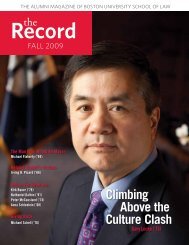the nature of representation: the cherokee right ... - Boston University
the nature of representation: the cherokee right ... - Boston University
the nature of representation: the cherokee right ... - Boston University
You also want an ePaper? Increase the reach of your titles
YUMPU automatically turns print PDFs into web optimized ePapers that Google loves.
102 PUBLIC INTEREST LAW JOURNAL [Vol. 15<br />
unbending, iron necessity tells us we must leave [our homes]. . . . There is<br />
but one path <strong>of</strong> safety, one road to future existence as a Nation. That path is<br />
open before you. Make a treaty <strong>of</strong> cession. Give up <strong>the</strong>se lands and go over<br />
beyond <strong>the</strong> great Fa<strong>the</strong>r <strong>of</strong> Waters. 57<br />
At least with respect to Major Ridge, <strong>the</strong>re is reason to doubt <strong>the</strong> argument <strong>of</strong>ten<br />
made against those who signed treaties with <strong>the</strong> government: that <strong>the</strong> Indian parties<br />
participated simply to be “made chiefs” by virtue <strong>of</strong> being selected by <strong>the</strong> U.S.<br />
government to sign <strong>the</strong> treaty. 58<br />
The main challenge for <strong>the</strong> Ridge group was that <strong>the</strong>y did not have <strong>the</strong> support<br />
<strong>of</strong> <strong>the</strong> Cherokee people. “In <strong>the</strong> final analysis, <strong>the</strong> wealthy, acculturated principal<br />
chief and not <strong>the</strong> editor [Boudinot] filled with missionary zeal represented <strong>the</strong><br />
sentiments <strong>of</strong> <strong>the</strong> Cherokee people.” 59 After Boudinot resigned from <strong>the</strong> Cherokee<br />
Phoenix because he disagreed with <strong>the</strong> single, Ross-driven message <strong>of</strong> <strong>the</strong> paper, 60<br />
<strong>the</strong> Ridge group attempted to limit Ross’s power. They enlisted <strong>the</strong> help <strong>of</strong> <strong>the</strong><br />
Georgia Guard to seize <strong>the</strong> Phoenix press, 61 which <strong>the</strong>y believed had been<br />
“prostituted to party politics.” 62 Even after Ross had lost <strong>the</strong> Phoenix and <strong>the</strong><br />
Cherokees were on <strong>the</strong> verge <strong>of</strong> being forced <strong>of</strong>f <strong>the</strong>ir homeland through <strong>the</strong><br />
maneuvering <strong>of</strong> <strong>the</strong> Ridge group and <strong>the</strong> U.S. government, <strong>the</strong> Daily National<br />
Intelligencer reported, “a more popular man with his own people does not live<br />
than John Ross.” 63<br />
Ross’s continued popularity is only one factor that makes it inaccurate to<br />
characterize Cherokee leadership as imploding during <strong>the</strong> period leading up to <strong>the</strong><br />
57<br />
Major Ridge to Cherokees at New Echota Treaty negotiations (Dec. 22, 1835), in<br />
WILKINS, supra note 38, at 287.<br />
58<br />
DeMallie, supra note 18, at 6. Ross accused <strong>the</strong> Ridge party <strong>of</strong> exactly this: “[The<br />
Cherokee People] deny <strong>the</strong> <strong>right</strong> <strong>of</strong> <strong>the</strong> few individuals who have presumedto arrogate<br />
to <strong>the</strong>mselves <strong>the</strong> powers <strong>of</strong> <strong>the</strong> Nation [by signing <strong>the</strong> New Echota Treaty].” Letter from<br />
Cherokee Delegate headed by John Ross to Lewis Cass (Feb. 29, 1836), in 1THE PAPERS<br />
OF CHIEF JOHN ROSS, supra note 14, at 389.<br />
While Major Ridge probably was not motivated by such ambition, historian Theda<br />
Perdue convincingly argues that “[<strong>the</strong>] rising middle-class, envious <strong>of</strong> <strong>the</strong> wealth and<br />
power <strong>of</strong> <strong>the</strong> elite and disdainful <strong>of</strong> <strong>the</strong> desires <strong>of</strong> <strong>the</strong> masses, saw in <strong>the</strong> removal issue an<br />
opportunity to usurp political authority and to reap rewards and concessions from <strong>the</strong><br />
United States.” Theda Perdue, The Conflict Within: Cherokees and Removal, in<br />
CHEROKEE REMOVAL:BEFORE AND AFTER 66 (WilliamL. Anderson ed., 1991).<br />
59<br />
CHEROKEE EDITOR:THE WRITINGS OF ELIAS BOUDINOT 158 (ThedaPerdue ed., 1983).<br />
60<br />
The Cherokee Phoenix was a Cherokee nation publication, and not an independent<br />
press. Ross explained, “[t]he views <strong>of</strong> <strong>the</strong> public authorities should continue and ever<br />
be in accordance with <strong>the</strong> will <strong>of</strong> <strong>the</strong> people; and<strong>the</strong>views<strong>of</strong> <strong>the</strong> editor <strong>of</strong> <strong>the</strong> national<br />
paper be <strong>the</strong> same.” Speech <strong>of</strong> John Ross to <strong>the</strong> Cherokee General Council (Aug. 4,<br />
1832), in 1THE PAPERS OF CHIEF JOHN ROSS, supra note 14, at 250.<br />
61<br />
MOULTON, supra note 23, at 65.<br />
62<br />
Letter from Benjamin F. Currey to John Ross (Sept. 9, 1835), in 1THE PAPERS OF<br />
CHIEF JOHN ROSS, supra note 14, at 353.<br />
63<br />
Daily National Intelligencer, Sept. 22, 1838, in HOIG, supra note 11, at 165.









